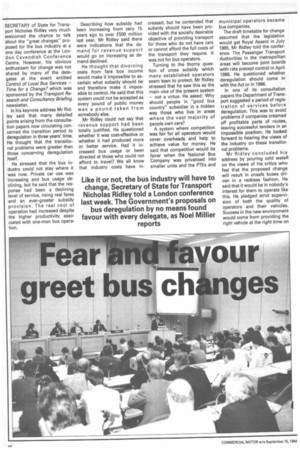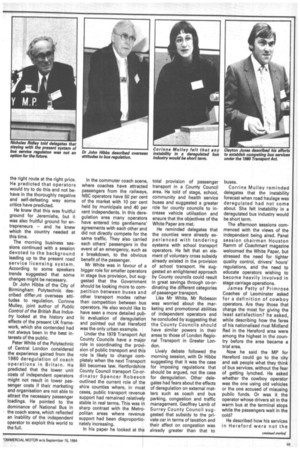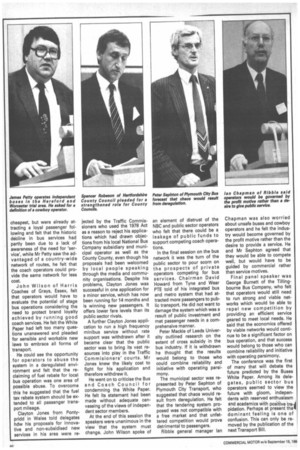Fear greet bus ch
Page 62

Page 63

Page 64

If you've noticed an error in this article please click here to report it so we can fix it.
Like it or not, the bus industry will have to change, Secretary of State for Transport Nicholas Ridley told a London conference last week. The Government's proposals on bus deregulation by no means found favour with every delegate, as Noel Millier reports
SECRETARY of State for Transport Nicholas Ridley very much welcomed the chance to talk about the "great changes" proposed for the bus industry at a one day conference at the London Cavendish Conference Centre. However, his obvious enthusiasm for change was not shared by many of the delegates at the event entitled Control of Local Bus Services — Time for a Change? which was sponsored by the Transport Research and Consultancy Briefing newsletter.
In his keynote address Mr Ridley said that many detailed points arising from the consultation papers now circulating concerned the transition period to deregulation in three years' time. He thought that the transitional problems were greater than those concerning deregulation itself.
He stressed that the bus industry could not stay where it was now. Private car use was increasing and bus usage declining, but he said that the response had been a declining level of service, rising real fares and an ever-greater subsidy provision. The real cost of operation had increased despite the higher productivity associated with one-man bus operation. Describing how subsidy had been increasing from zero 15 years ago to over £500 million last year, Mr Ridley said there were indications that the dema nd for revenue support would go on increasing as demand declined.
He thought that divorcing costs from fare box income would make it impossible to ascertain what subsidy should be and therefore make it impossible to control. He said that this system could not be accepted as every pound of public money was a pound taken from somebody else.
Mr Ridley could not say that revenue support had been totally justified. He questioned whether it was cost-effective or whether it had produced more or better service. Had it increased bus usage or been directed at those who could not afford to travel? We all know that industry costs have in
creased, but he contended that subsidy should have been provided with the socially desirable objective of providing transport for those who do not have cars or cannot afford the full costs of the transport they require. It was not for bus operators.
Turning to the thorny question of cross subsidy which many established operators seem keen to protect, Mr Ridley stressed that he saw this as the main vice of the present system — not a virtue. He asked: Why should people in "good bus country" subsidise in a hidden way those who live in areas where the vast majority of people own cars?
A system where competition was fair for all operators would cover overheads and help to achieve value for money. He said that competition would be fairer when the National Bus Company was privatised into smaller units and the PTEs and municipal operators became bus companies.
The draft timetable for change assumed that the legislation would get Royal Assent in July 1985, Mr Ridley told the conference. The Passenger Transport Authorities in the metropolitan areas will become joint boards with rate precept control in April 1986. He questioned whether deregulation should come in with the Act or in 1986.
In one of its consultation papers the Department of Transport suggested a period of registration of services before deregulation. This was to avoid problems if companies creamed off profitable parts of routes, leaving successful tenders in an impossible position. He looked forward to hearing the views of the industry on these transitional problems.
Mr Ridley concluded his address by pouring cold waterk on the views of his critics who feel that the proposed change will result in unsafe buses driven in a reckless fashion. He said that it would be in nobody's interest for them to operate like this. He pledged strict supervision of both the quality of operators and their vehicles. Success in the new environment would come from providing the right vehicle at the right time on the right route at the right price. He predicted that operators would try to do this and not behave in the thoroughly negative and self-defeating way some critics have predicted.
He knew that this was fruitful ground for Jeremiahs, but it was also fruitful ground for entrepreneurs — and he knew which the country needed at this time.
The morning business sessions continued with a session devoted to the background leading up to the present road service licensing system. According to some speakers trends suggested that some changes might be necessary.
Dr John Hibbs of the City of Birmingham Polytechnic described differ...int overseas attitudes to regulation. Corinne Mu!ley, joint author of Public Control of the British Bus Industry looked at the history and effects of the present UK framework, which she contended had not always been in the best interests of the public.
Peter White of the Polytechnic of Central London considered the experience gained from the 1980 deregulation of coach operations in Britain. He predicted that the lower unit costs of independent operators might not result in lower passenger costs if their marketing and organisation are not able to attract the necessary passenger loadings. He pointed to the dominance of National Bus in the coach scene, which reflected an inability of the independent operator to exploit this world to the full. In the commuter coach scene, where coaches have attracted passengers from the railways, NBC operators have 50 per cent of the market with 10 per cent held by municipals and 40 per cent independents. In this deregulation area many operators have entered into gentlemens' agreements with each other and did not directly compete for the same traffic. They also carried each others' passengers in the event of an emergency, such as a breakdown, to the obvious benefit of the passenger.
Mr White was in favour of a bigger role for smaller operators in stage bus provision, but suggested that the Government should be looking more to competition between buses and other transport modes rather than competition between bus operators. He also would like to have seen a more detailed public evaluation of deregulation and pointed out that Hereford was the only urban example.
Under the 1978 Transport Act County Councils have a major role in coordinating the provision of public transport and this role is likely to change completely when the next Transport Bill becomes law. Hertfordshire County Council transport Co-ordinator Spencer Robeson outlined the current role of the shire counties where, in most cases, public transport revenue support had remained relatively stable in real terms. This was in sharp contrast with the Metropolitan areas where revenue support had been disproportionately increasing.
In his paper he looked at the total provision of passenger transport in a County Council area. He told of stage, school, community and health service buses and suggested a greater role for county councils to increase vehicle utilisation and ensure that the objectives of the White Paper are met.
He reminded delegates that the counties were already experienced with tendering systems with school transport operators. He felt that an element of voluntary cross subsidy already existed in the provision of school transport. He suggested an enlightened approach by County councils could result in great savings through co-ordinating the different categories of passenger transport.
Like Mr White, Mr Robeson was worried about the marketing and promotional abilities of independent operators and he concluded by suggesting that the County Councils should have similar powers in their areas to those of London Regional Transport in Greater London.
Lively debate followed the morning session, with Dr Hibbs suggesting that it was the case for imposing regulations that should be argued, not the case for deregulation. Other delegates had fears about the effects of deregulation on external matters such as coach and bus parking, congestion and traffic management. Geoffrey Lamb of Surrey County Council suggested that subsidy to the private car in terms of taxation and their affect on congestion was already greater than that to buses.
Corrine Mulley reminded delegates that the instability forecast when road haulage was deregulated had not come about. She felt instability in a deregulated bus industry would be short term.
The afternoon sessions commenced with the views of the independent being aired. Panel session chairman Houston Ramm of Coachmart magazine welcomed the White Paper, but stressed the need for tighter quality control, drivers' hours' regulations, and the need to educate operators wishing to become heavily involved in stage carriage operations.
James Petty of Primrose Coaches of Leominster asked for a definition of cowboy operators. Are they those that charge the most for giving the least satisfaction? he asked, while describing how the fares of his nationalised rival Midland Red in the Hereford area were among the highest in the country before the area became a trial area.
Now he said the MP for Hereford could go to the city and ask people what they think of bus services, without the fear of getting lynched. He asked whether the cowboy operator was the one using old vehicles or the one accused of misusing public funds. Or was it the operator whose drivers sit in the warm bus at the terminal stops while the passengers wait in the cold?
He described how his services in Hereford were not the cheapest, but were already attracting a loyal passenger following and felt that the historic decline in bus services had partly been due to a lack of awareness of the need for 'ser vice', while Mr Petty saw the advantaged of a country-wide network of routes, he felt that the coach operators could provide the same network for less cost.
John Wilson of Harris Coaches of Grays, Essex, felt that operators would have to evaluate the potential of stage bus operations considering the need to protect brand loyalty achieved by running good coach services. He felt the White Paper had left too many ques tions unanswered and pleaded for sensible and workable new laws to embrace all forms of transport.
He could see the opportunity for operators to abuse the system in a deregulated envi
ronment and felt that the reclaiming of fuel rebate for local bus operation was one area of possible abuse. To overcome this he suggested that the fuel tax rebate system should be extended to all passenger trans port mileage.
Clayton Jones from Ponty pridd in Wales told delegates hdw his proposals for innovative and non-subsidised new services in his area were re
jected by the Traffic Commissioners who used the 1978 Act as a reason to reject his applications which had drawn objections from his local National Bus Company subsidiary and municipal operator as well as the County County, even though his proposals had been welcomed by local people speaking through the media and community organisations. Despite his problems, Clayton Jones was successful in one application for a minor service, which has now been running for 14 months and is winning new passengers. It offers lower fare levels than its public sector rivals.
A further Clayton Jones application to run a high frequency minibus service without rate support was withdrawn after it became clear that the public sector was to bring its vast resources into play in the Traffic Commisioners' courts. Mr Jones knew the likely cost to fight for his application and therefore withdrew it.
He went on to criticise the Bus and Coach Council for condemning the White Paper. He felt its statement had been made without adequate canvassing of the views of independent sector members.
At the end of this session the speakers were unanimous in the view that the system must change. John Wilson spoke of an element of distrust of the NBC and public sector operators who felt that there could be a leakage of public funds to support competing coach operations.
In the final session on the bus network it was the turn of the public sector to pour scorn on the prospects of private operators competing for bus services. Chairman David Howard from Tyne and Wear PTE told of his integrated bus and metro system that had attracted more passengers to public transport. He did not want to damage the system which was a result of public investment and met passenger needs in a comprehensive manner.
Peter Mackie of Leeds University outlined research on the extent of cross subsidy in the bus industry. If it is withdrawn he thought that the results would belong to those who could combine reliability and initiative with operating parsimony.
The municipal sector was represented by Peter Sephton of Plymouth City Transport, who suggested that chaos would result from deregulation. He felt that the tendering system proposed was not compatible with a free market and that unfettered competition would prove detrimental to passengers.
Ribble general manager Ian
Chapman was also worried about unsafe buses and cowboy operators and he felt the industry would become governed by the profit motive rather than the desire to provide a service. He and Mr Sephton agreed that they would be able to compete
well, but would have to be guided by commercial rather than service motives.
Final panel speaker was George Burnett of the Tillingbourne Bus Company, who felt that operators would still need to run strong and viable net works which would be able to repel new competition by providing an efficient service geared to meet local needs. He said that the economics offered by viable networks would continue to be a significant factor on bus operation, and that success would belong to those who can combine reliability and initiative with operating parsimony.
The conference was the first of many that will debate the future predicted by the Buses White Paper. Among its dele gates, public sector bus operators seemed to view the future with gloom, independents with reserved enthusiasm
and academics with positive tre-1 pidation. Perhaps at present the
dominant feeling is one of confusion. This can only be re moved by the publication of the next Transport Bill.






























































































